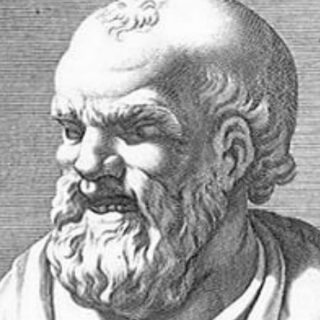Philosophy & History Blog
Philolaus of Croton (470–400 BCE), a representative of the Pythagorean school, discovered that the Earth moves. According to his cosmological system, an eternal and unquenchable Central Fire lies at the center of the universe and illuminates the world. Around this fire rotate the Earth, a hypothetical Counter-Earth (Antichthon) that is...
Epicurus (341-270 BCE), one of the greatest philosophers of the ancient world, founded a school of philosophy at the age of 32 and laid the foundations of Epicureanism. In 306 BCE, he moved his school to Athens, which was named the “Garden of Epicurus,” and it remained active for more...
Sometimes Democritus (c. 460–370 BCE) would laugh heartily, and to those around him, this laughter seemed senseless, occasionally interpreted as a sign of madness. Even Hippocrates was invited to check Democritus’ mental health. However, the “father of medicine” concluded that the philosopher was physically and mentally sound. Furthermore, he regarded...
Zeno of Elea (c. 490 – 430 BCE) is famous for his paradoxes. A member of the Eleatic school of philosophy and a student of Parmenides, he agrees with and supports his teacher’s theory. To do this, the Eleatic philosopher uses paradoxes. This is why Aristotle refers to him as...
The great Nietzsche calls out to humanity with these words in his central work Thus Spoke Zarathustra: Zarathustra turned to the people and said: “I teach you the overman. Man is something that shall be overcome. What have you done to overcome him?… All beings so far have created something...
It is already known to us that Greek philosophy emerged in the 7th century BC. The first philosopher, Thales, laid the foundation for the first school of philosophy. The philosophers of Miletus were interested in what lies at the foundation of the world, i.e., the primary substance, the origin of...
Feeling his legs grow heavy, the philosopher lay on his back. Surrounded by students and followers who couldn’t hold back their tears, he awaited his final breath. Suddenly, the gaze of the seventy-year-old man froze. Socrates (470–399 BCE) had died. “A virtuous citizen and person does not act this way,”...
With its unique culture, political system, and philosophy, Greece is one of the first settlements of mankind. Ancient Greece is a universe in itself. The history of Ancient Greece spans from the 8th to the 2nd centuries BCE. During this period, Greek culture began to form, a new Greek alphabet...
Empedocles, a resident of the city of Acragas in South Italy (c. 494 – 434 BCE), was not only the doctor of his time but also a famous philosopher. History knows him primarily as a philosopher. Therefore, this wise man was both a physicist, an astronomer, and a biologist. Empedocles...
Parmenides of Elea (c. 510–440 BCE), the founder of the Eleatic school of philosophy, is one of the central figures of ancient Greek philosophy. He is regarded as the creator of metaphysics, primarily due to his work On Nature. What is Metaphysics? Metaphysics is a branch of philosophy that studies...
Gods resemble the humans who created them; mythology is a product of human imagination. This thought belongs to Xenophanes (570–475 BCE), a philosopher who opposed polytheism. If gods resemble humans, meaning they are anthropomorphic, then they are not morally superior to humans. In that case, should they be worshipped? Xenophanes...










